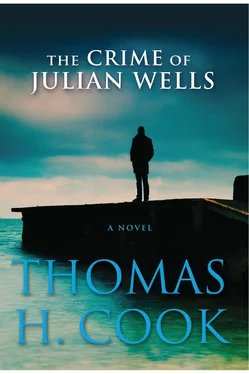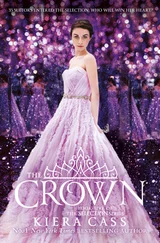Thomas Cook - The Crime of Julian Wells
Здесь есть возможность читать онлайн «Thomas Cook - The Crime of Julian Wells» весь текст электронной книги совершенно бесплатно (целиком полную версию без сокращений). В некоторых случаях можно слушать аудио, скачать через торрент в формате fb2 и присутствует краткое содержание. Год выпуска: 2012, ISBN: 2012, Издательство: Grove Press, Жанр: Криминальный детектив, на английском языке. Описание произведения, (предисловие) а так же отзывы посетителей доступны на портале библиотеки ЛибКат.
- Название:The Crime of Julian Wells
- Автор:
- Издательство:Grove Press
- Жанр:
- Год:2012
- ISBN:9780802194589
- Рейтинг книги:5 / 5. Голосов: 1
-
Избранное:Добавить в избранное
- Отзывы:
-
Ваша оценка:
- 100
- 1
- 2
- 3
- 4
- 5
The Crime of Julian Wells: краткое содержание, описание и аннотация
Предлагаем к чтению аннотацию, описание, краткое содержание или предисловие (зависит от того, что написал сам автор книги «The Crime of Julian Wells»). Если вы не нашли необходимую информацию о книге — напишите в комментариях, мы постараемся отыскать её.
The Crime of Julian Wells — читать онлайн бесплатно полную книгу (весь текст) целиком
Ниже представлен текст книги, разбитый по страницам. Система сохранения места последней прочитанной страницы, позволяет с удобством читать онлайн бесплатно книгу «The Crime of Julian Wells», без необходимости каждый раз заново искать на чём Вы остановились. Поставьте закладку, и сможете в любой момент перейти на страницу, на которой закончили чтение.
Интервал:
Закладка:
“So why were you late?” my father asked.
“I was with Loretta,” I explained. “We met for a drink.”
My father nodded softly. “So sad about Julian. Please give her my best at the service.”
He had decided not to attend the upcoming memorial, and given his many aches and pains, I didn’t press the issue, since I knew that his arthritis would make the ride to Montauk difficult for him.
“Did you hear what happened today?” my father asked. “More bombings in Europe. It’s the price of colonialism. You should never invade another people’s country if you don’t expect to be invaded in return.”
My father had toiled his life away as a State Department bureaucrat, his eyes forever glancing wistfully at the oversized globe he’d hauled from office to office during his long tenure in the old gray C Street building rightly situated, he’d once joked, in an area of the capital known as Foggy Bottom.
“When the Soviet Union fell, I thought we might have a few years of actual peace,” he added. He shook his head in grim frustration. “But humanity isn’t made for peace. It finds a hundred ways to keep itself riled up.”
He’d hoped to devote his life to peace, an ambition that had foundered on the banks of Foggy Bottom at least in part because as a young man he’d made the mistake of joining a few ultraliberal organizations, though that was but the first of many problems that had stymied his career. Succinctly put, he’d had a warm heart during a Cold War, and for that reason he’d been shuttled from desk to desk, his hopes for an appointment that would give him genuine authority forever thwarted by his own fierce feeling that the human interest was larger than the national interest, a view that had won him many friends among the radical reformers of the Third World, but none in Washington.
It was a failure that struck deep, all the more so given that his own forefathers had been robust men of affairs, both soldiers and diplomats. Portraits of those men now lined the walls of his apartment, men in uniforms and formal dress who with equal courage had faced bullets on the field and bullying at the negotiating table.
Given the blighted nature of his career, I’d assumed that retirement would be a good thing for my father, but he hadn’t taken to it very well. Certainly, he had not wanted to move to New York, but the last of his old friends had died, and he’d been left alone in his Tidewater house. At last he’d acquiesced to my repeated entreaties for him to move north, where he could enjoy the many diversions of the city, along with the company of his son. Nor did he seem to regret this move, though there were times when the pall of loneliness came over him and he stared out at a skyline he probably found as foreign as the minarets of Cairo.
“So how are you feeling?” I asked.
“Good enough,” my father answered.
I glanced at the array of pill containers that sprouted like sickly orange growths from the top of the small, wooden table beside my father’s chair. It’s not that we grow old, I thought, but that we grow old in decline and discomfort, and these hardships are made worse by the awareness that nothing will improve. No coming days will dawn brighter than the last that dawned, and this sorrow is further deepened by a fear of death-one that I could on occasion see in my father’s eyes. Those same eyes had some years before begun to fail, so he had given up reading spy novels and Westerns for watching movies of the same ilk, John Wayne and Gary Cooper the unlikely heroes of his waning years.
“Loretta and I talked about Julian, of course,” I said. “She thought he was already planning his next book.”
“Already at work on the next one?” my father asked. “I thought he’d just come back from Russia.”
“He had, but rest was never Julian’s thing,” I said. “So, once he’d finished the book on Chikatilo, I suppose he just began to research the next one.”
“Chikatilo?” my father asked. “Who is that?”
“A Russian serial killer.”
My father shook his head. “I don’t know how Julian lived with such people in his head.”
“For some people, bad things are alluring, I suppose,” I said. “Chekhov went all the way to Sakhalin, and Robert Louis Stevenson-”
“Well, it’s unhealthy, if you ask me,” my father interrupted with a quick wave of his hand. “Unhealthy to sink into that mire.” He leaned forward and massaged one of his knees. “I remember that first summer when Julian came to stay with us. We fished all day, remember?”
I nodded. “Loretta stayed with an aunt that summer. In Chicago.”
“But Julian came to Two Groves,” my father said. His spirit lifted on a memory. “We took long walks in the orchard.”
It was a fine house, to say the least, set upon substantial acreage, but hardly the Tara of Gone with the Wind that its grand title suggested. Still, Julian had made considerable sport of Two Groves before his visit there. “We come from houses that have addresses,” he would tell some recent acquaintance, “but Philip here comes from TWO GROVES!”
“Julian saved your life that summer,” my father added.
I saw him dive cleanly into the water, then swim furiously toward me. I’d tried to swim too far and had exhausted myself. Had Julian not been there, I would most certainly have drowned. Over the years, my father had mentioned this incident many times. Julian, of course, never had.
“Do you think he would have risen to the top at the State Department?” I asked.
“Probably not,” my father answered. On that word, his mood abruptly soured. “Well, I should be off to bed now, Philip.”
He rose with the help of a cane that was itself a part of his regalia, dark wood, with a brass eagle’s head grip. Using it, he stood very erect, and in that proud stance, made his way slowly across the room, I at his side, but careful not to extend my hand or offer any unnecessary physical support. That would come at some point, I knew, but not yet, and as long as my father could make his way without assistance, I let him do so.
We were halfway down the corridor when he stopped and nodded toward a photograph of his father in his doughboy uniform.
“Julian noticed that picture,” he said. “It was hanging in the library at Two Groves, and he asked me if my father had ever killed a man. I said he probably had, but that he’d been an artillery officer in the Great War, so he probably never saw the people he killed. I remember that Julian said he thought it must be quite different to kill close up, looking your victim directly in the eye.”
“He described just that sort of close-up murder once,” I said. “It’s in The Tortures of Cuenca. He has a sister imagine the killing of her brother, how the murderer must have actually felt her brother’s dying breath. On his face, I mean. I remember the phrase he used. He called it ‘the last moist breath of life.’”
“Moist,” my father whispered. “How would Julian have known that a last breath is moist?”
He moved forward again before he stopped, turned back and looked at me, a glance that alerted me that I’d unaccountably remained behind.
“Are you all right, Philip?” he asked.
“Yes, why?” I asked.
“You look odd, that’s all.”
I shook my head. “Not at all,” I assured him. “I was just thinking of Julian, how deeply he sank into the crimes he described.”
“Julian had a lot of feeling,” my father said, “but too much of it was morbid.”
He turned and made his way into the bedroom, I now at this side. He was already in his pajamas, and so, after taking off his robe, he eased himself into the bed, all of this done without my assistance, but under my watchful eye.
Читать дальшеИнтервал:
Закладка:
Похожие книги на «The Crime of Julian Wells»
Представляем Вашему вниманию похожие книги на «The Crime of Julian Wells» списком для выбора. Мы отобрали схожую по названию и смыслу литературу в надежде предоставить читателям больше вариантов отыскать новые, интересные, ещё непрочитанные произведения.
Обсуждение, отзывы о книге «The Crime of Julian Wells» и просто собственные мнения читателей. Оставьте ваши комментарии, напишите, что Вы думаете о произведении, его смысле или главных героях. Укажите что конкретно понравилось, а что нет, и почему Вы так считаете.












